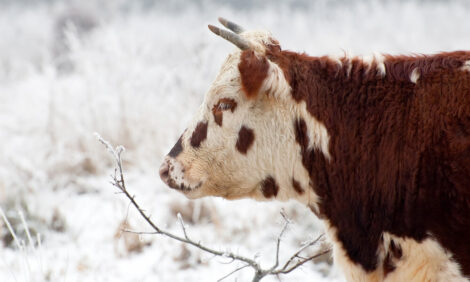



Committee Approves 35 CBB Programmes
US - The Beef Promotion Operating Committee this week approved spending the Cattlemen’s Beef Board (CBB) Fiscal Year 2009 program budget of $42 million on a total of 35 national checkoff programs.But, according to the beef board it was not an easy process, as committee members passionately debated proposals in an effort to find places to cut expenditures enough to meet decreasing revenue projections.
“We knew going in that it was going to be an especially difficult year,” said CBB and Operating Committee Chairman Dave Bateman, a producer from Illinois. “In July, we approved a budget that was down 6.6 percent from a year ago. Before our meeting this week, however, we realized that the 2009 revenue projections we made in July actually were still too optimistic, so we had to cut back even more than we had anticipated.”
* "We knew going in that it was going to be an especially difficult year" |
|
CBB and Operating Committee Chairman Dave Bateman, a producer from Illinois.
|
At the 2008 Cattle Industry Summer Conference in July, CBB approved a program budget of $43.5 million for Fiscal Year 2009, which begins Oct. 1, 2008. Upon revaluating checkoff collections and projections again this week, however, the Operating Committee recommended an amendment that reduced that 2009 program budget to $42 million. In addition to the CBB budget, the Federation of State Beef Councils had approved a total of about $8.1 million to put toward national programs, bringing the combined total budget for approved programs to about $50.1 million, down from a combined total of about $57.4 million in the current fiscal year.
“Anyone who sat in that room this week as we struggled to identify the least-damaging places to make cuts in checkoff programs for next year will tell you that it was difficult at best, and certainly emotional,” Bateman said. “As we have watched checkoff assessments dwindle during the last couple of years, we have trimmed anything and everything that we thought we could sacrifice and still have successful programs. Cutting more programs touched some nerves. But members of this committee stepped up and made the difficult decisions.”
The plan of work funds promotion, research and information programs and is designed to build demand for beef using national checkoff funds. The Operating Committee, which is made up of 10 CBB members and 10 representatives from state beef councils, had to balance the industry’s requests for funding against anticipated checkoff collections for Fiscal Year 2009. USDA still must approve the plan before any funds can be expended.
“This plan came together after a day and a half of presentations and some very lively discussion,” Bateman said. “All of the contractors presenting proposals for checkoff funding knew about our budget challenges and brought us excellent programs to choose from. Of course, that made it even more difficult to trim because we knew we were letting go of some good opportunities for producers no matter what we did.” The result, Bateman said, is a menu of checkoff activities to create what Operating Committee members believe to be the best opportunities for cattle producers in the coming fiscal year – given the budget constraints.
Contractors with program proposals included in the plan are the American National CattleWomen (ANCW), the Cattlemen’s Beef Board (CBB), the Meat Importers Council of America (MICA), the National Cattlemen’s Beef Association (NCBA), and the U.S. Meat Export Federation. The approved national checkoff plan of work for Fiscal Year 2009 – including CBB and Federation of State Beef Council dollars – looks like this:
- About $23.3 million for promotion (CBB: $19.7 million; Federation: $3.6 million). Promotion efforts include consumer advertising, retail marketing, foodservice marketing, new product and culinary initiatives, the National Beef Cook-Off; a Northeast Beef Promotion Initiative to build demand in densely populated Northeast states, and veal promotion.
- Almost $7.7 million for research projects (CBB: $6.5 million; Federation: $1.2 million). These projects will focus on a variety of critical issues, including beef safety research, product enhancement research, nutrition research, and market research.
- Just over $6.2 million for consumer information programs (CBB: $5.3 million; Federation: $954,500), including a Northeast public relations initiative, national public relations, and nutrition influencers support.
- About $2.9 million for industry information projects (CBB: $2.4 million; Federation: $454,500). Industry information comprises beef and dairy-beef quality assurance programs and dissemination of accurate information about the beef industry to counter misinformation from anti-beef groups and others.
- About $7.7 million for foreign marketing efforts managed by the U.S. Meat Export Federation (CBB: $5.8 million; Federation: $1.9 million). This will cover marketing and education efforts about U.S. beef in the ASEAN region; the Caribbean; Central/South America; the Dominican Republic; Europe; the Middle East; the Greater China area; Japan; Mexico; Russia; South Korea; and Taiwan.
- A total of $1.9 million in Beef Board dollars for producer communications which includes producer outreach using paid media, direct communications, earned media, communications through livestock markets; and an annual producer attitude survey.
Cuts in program budgets were spread across various categories to minimize the overall effect of the budget reduction. Some deeper cuts were required, however, with the hardest hits in funding for producer communications, including the Beefmobile; youth education; and the Beef Ambassador Program. Despite these cuts, programs funded in new product development, consumer information and public relations have youth-education elements in them to provide continuous reach to America’s youth.
Programs authorized by the Operating Committee must be approved by USDA before any money can be spent. Each contractor of the Beef Checkoff Program works on a cost-recovery basis and, by law, cannot profit from work they do on behalf of the Beef Board and state beef councils. Each contractor is subject to audits by CBB and USDA on an ongoing basis.
TheCattleSite News Desk


